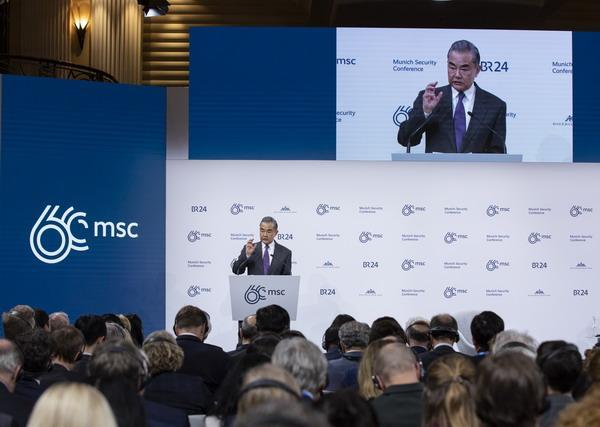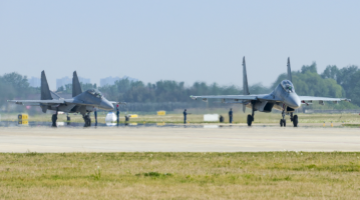
Member of the Political Bureau of the Communist Party of China (CPC) Central Committee and Chinese Foreign Minister Wang Yi attended the Munich Security Conference (MSC) on February 17, 2024. (Photo/Chinese Ministry of Foreign Affairs)
By Xu Lifan
Member of the Political Bureau of the Communist Party of China (CPC) Central Committee and Chinese Foreign Minister Wang Yi attended the Munich Security Conference (MSC) on February 17 and delivered a keynote speech entitled "Firmly acting as a force for stability in a turbulent world" during the "China in the World" session.
Wang Yi pointed out that all countries can seek win-win, avoid lose-lose, and work together like passengers in the same boat to bring more certainty to the world and usher in a brighter future for humanity. Wang Yi said that China, as a responsible major country, will keep its major principles and policies consistent and stable and serve as a staunch force for stability in a turbulent world. First, China will be a force for stability in promoting cooperation between major countries. Second, China will be a force for stability in addressing hotspot issues. Third, China will be a force for stability in enhancing global governance. Fourth, China will be a force for stability in promoting global growth.
The interpretations of these four forces for stability demonstrate China's accountability for maintaining world peace and show China's top-level thinking and action plans for promoting global security governance.
In recent years, with the rebalancing of major power relations, intensification of geopolitical games, the resurgence of the Cold War mentality and the rise of bloc politics and power politics, the US has been inciting relevant countries to build so-called "small yard, high fence", parallel systems, Five Eyes alliance, the QUAD and the AUKUS, and facilitating the expansion of NATO from eastward to northward. All such moves are the concrete manifestations of the profound changes in the international political and economic order, and these political manipulations have undoubtedly exacerbated the global turbulence.
Amid the accelerated evolution of dramatic changes in the world, China has positioned itself as "a staunch force for stability in a turbulent world". This stance of China has been reflected in its past strategic actions.
China has been continuously implementing the consensuses reached by the heads of state of China and the US, and proposed that China-US interactions should be defined by dialogue and win-win cooperation, not confrontation or zero-sum competition. China promotes the China-Russia comprehensive strategic partnership of coordination for a new era to maintain high-level development, adheres to the orientation of the China-EU partnership, supports the strategic autonomy of the EU, and acts as a force for stability in promoting cooperation between major countries.
Events such as the resumption of diplomatic relations between Iran and Saudi Arabia, the expansion of BRICS from five to ten countries, the successful wrap-up of the Third Belt and Road Forum for International Cooperation, and the First China-Central Asia Summit have recorded China's efforts to strengthen unity and cooperation among the Global South countries and enhance the discourse of developing countries in global affairs.
China issued China's Position on the Political Settlement of the Ukraine Crisis, actively mediated the Russia-Ukraine conflict, and proposed the two-state solution for the new round of the Israeli-Palestinian conflict, reflecting China's established position of upholding impartiality and justice and addressing both the symptoms and root causes on hotspot issues.
China's proposal to act as "a staunch force for stability in a turbulent world" at this year's MSC is particularly valuable.
Pessimistic sentiment pervaded in the MSC of this year. The Munich Security Report 2024 says that the optimism about peace, stability and economic development in the post-Cold War era has dissipated, and the world is at risk of falling into a "lose-lose" situation. UN Secretary-General Antonio Guterres also said in his speech at the opening ceremony on February 16 that "today's global order is not working for everyone" and "even the Cold War era was in some ways less dangerous".
The pervasion of pessimism is relevant to the Ukraine crisis and the Israeli-Palestinian conflict on the one hand, as evidenced by the Munich Security Report that mentions the war fatigue of Western countries. On the other hand, it is also connected with the US election, and many European countries feel uneasy about Trump abandoning their NATO allies reluctant to increase military expenditure.
The anxiety at the MSC reflects, to a certain extent, that the Western security concept and the resulting exclusive security system have been incapable of addressing security challenges and may even affect their own security. On the contrary, it also highlights the value of China's new security concept.
The vision of common, comprehensive, cooperative and sustainable security proposed by China is winning the recognition of more and more states, and more than 80 countries and regions have endorsed and echoed it. In the face of the ever-expanding connotation and denotation of existing global security issues, China's new security concept is evidently the preferred choice to solve the dilemma of international security governance and avoid a lose-lose situation. It can be believed that as China's new security concept gains wider recognition, China, as a reliable force for stability in this turbulent world, will garner more extensive support from the international community.
Editor's note: Originally published on china.com.cn, this article is translated from Chinese into English and edited by the China Military Online. The information and opinions in this article do not necessarily reflect the views of eng.chinamil.com.cn.









